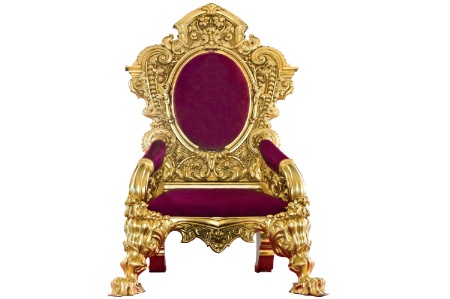Furniture wars
“There is no connection between the two events.”
That was the forceful response from our Director of Creative Finance, Mr D. C. F. Tapstock, when reporter Keith Ponting (30) suggested to him that there were “alarming similarities” between recent developments at Poppleton and at the Plymouth University.
But surely, Ponting persisted, some of the questions that had been raised about the financial probity of Plymouth’s decision to buy seven handcrafted chairs for £95,000 for use in graduation ceremonies might also be relevant to Poppleton’s own recent investment in special seating.
But Mr Tapstock maintained that Poppleton’s decision to purchase a hand-tooled throne for the use of our vice-chancellor was “of a different order of things”. For while the cost of the throne had greatly exceeded the price
of the Plymouth chairs, our vice-chancellor would not be retaining his new throne for merely ceremonial occasions but would be making use of it for such everyday matters as terminating academic contracts and interviewing applicants for the newly created raft of managerial posts.
Tapstock was also anxious to deny the “more exaggerated claims” about the throne’s magnificence. For although the vice-chancellor’s new seat was supported by six massive feet “made of a golden material” and overarched by a canopy supported on 12 pillars of “a marble material”, it was quite untrue that the throne also sported two large ruby-encrusted peacocks. He hoped this clarified the situation.
Anyone for compromise?
Our distinguished Professor of Astronomy Dr “Ringo” Azimuth has admitted in a revealing interview with The Poppletonian that he “slightly tailored” some of his high-level lunar research work so as to make it “more acceptable” to the producers of the television astronomy programme Heavens Above!
Dr Azimuth said that he’d been prompted to make his confession after reading the abstracts of a British Academy conference devoted to the ways in which academics might make their work more acceptable to a wider audience.
He’d specifically identified with the suggestion from Roger Luckhurst, professor in modern and contemporary literature at Birkbeck, University of London, that academics should be a little less precious and accept that certain programmes allowed them little or no control over their raw material.
It was a recognition of this state of affairs, said Dr Azimuth, that had led him to “somewhat temper” his own research into the measurement of gravity on the four large far-side basins of the Moon. This adaptation meant that after briefly outlining the extent to which each of these far-side Moon basins contained a gravity maximum relative to the surrounding basin, he had gone on to agree with the suggestion from the Heavens Above! interviewer that part of the lunar landscape might indeed be made of cheese. However, even under some pressure to expand on this remark, he had resolutely refused to speculate on its colour.
Thought for the week
(contributed by Jennifer Doubleday, Head of Personal Development)
“A recent blog referred to elderly academics who love looking backwards ‘at the glory days of their past’. In a new series of seminars, we will seek to recapture some of the most glorious aspects of those days. This week’s seminar will be led by Professor Gordon Lapping and is titled ‘Remembering the Bursar’.”
Register to continue
Why register?
- Registration is free and only takes a moment
- Once registered, you can read 3 articles a month
- Sign up for our newsletter
Subscribe
Or subscribe for unlimited access to:
- Unlimited access to news, views, insights & reviews
- Digital editions
- Digital access to THE’s university and college rankings analysis
Already registered or a current subscriber?
